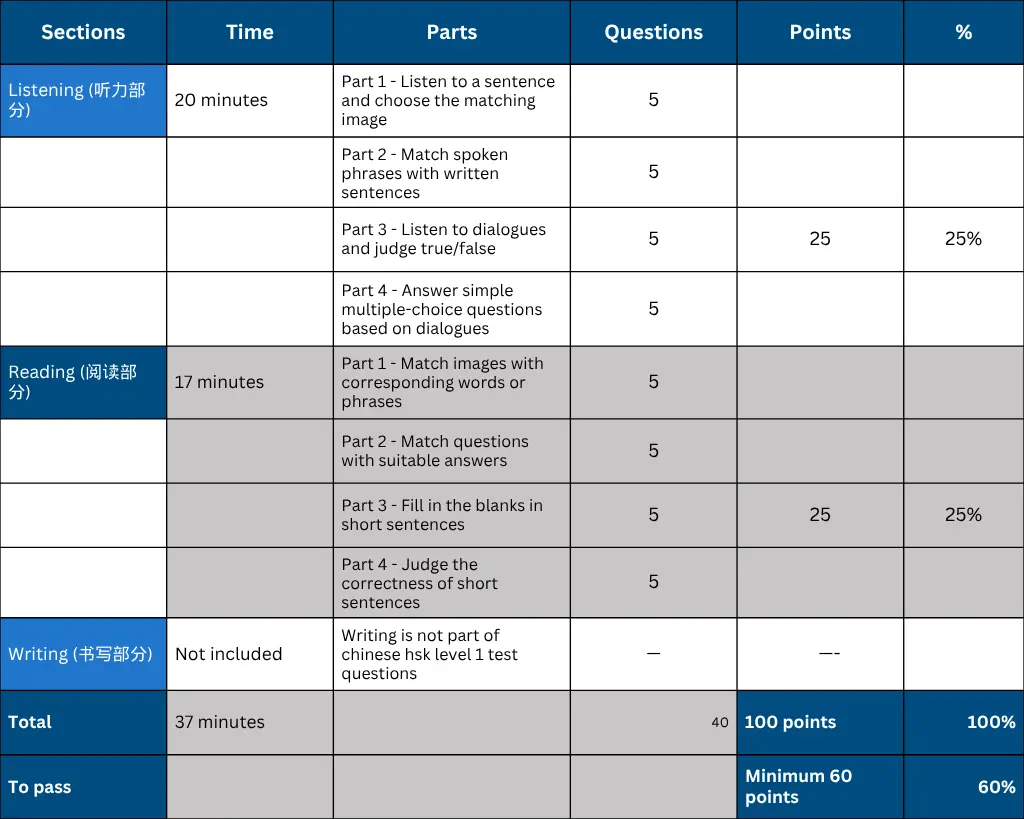Chinese HSK Level 1 is the entry point to mastering one of the world’s most spoken languages through a structured and practical approach. A Chinese exam like this is designed to evaluate how effectively beginners can navigate everyday conversations using essential vocabulary and phrases. It focuses on real-life communication rather than textbook memorization, making it ideal for learners just starting their Mandarin journey. This exam reflects a learner’s ability to listen, read, and respond in simple, meaningful ways.
Exam structure

This table clearly explains the chinese hsk level 1 exam structure and what learners can expect from the Chinese hsk level 1 test questions. Let me know if you’d like it in paragraph format or visual design for your website or article.
Exam Eligibility Criteria
The chinese hsk level 1 exam is designed for absolute beginners who are starting their journey in Mandarin. It is ideal for anyone who wants to measure their ability to understand and use very basic Chinese in real-life situations. There are no complex grammar expectations or advanced vocabulary required, making it a stress-free entry point into the language.
- Minimum Age Recommendation: While there is no official age limit, the test is typically suitable for learners aged 10 and above. The content reflects daily life, making it accessible to both young students and adult beginners.
- No Prior Knowledge Required: Candidates do not need any background in Chinese language learning before attempting chinese hsk level 1. It’s structured for those who are learning Mandarin from scratch and want to assess their basic listening and reading skills.
- No Academic Restrictions: Whether you are a student, a professional, or a language enthusiast, you are eligible to take this exam. The focus remains on your practical understanding of chinese hsk level 1 test questions rather than your academic background.
- Open to All Nationalities: The exam is available to non-native speakers of Chinese from any country. It provides a universally accepted benchmark for foundational Mandarin language skills.
- Simple Registration Process: Enrolling in the exam is straightforward and does not require institutional affiliation. As long as you’re interested in attempting chinese hsk level 1 test questions, you can register directly through approved test centers or official platforms.
- Beginner-Friendly Format: The structure and language used in chinese hsk level 1 make it approachable even for very new learners. The vocabulary and grammar are intentionally simple to reflect everyday scenarios such as introductions, shopping, or asking directions.
Exam Pattern – Detailed Structure
The chinese hsk level 1 exam is designed to evaluate a beginner’s ability to understand and use basic Mandarin in practical daily situations. It consists of two main sections: Listening and Reading, both delivered in multiple-choice format and focused on essential vocabulary and simple sentence structures outlined in the HSK 1 syllabus.
Listening (听力) – ~20 minutes | 4 parts | 20 questions
Part 1: Listen to short sentences and choose the picture that matches what you hear.
Part 2: Match spoken phrases with written sentences.
Part 3: Listen to brief conversations and decide whether statements are true or false.
Part 4: Answer simple comprehension questions based on dialogues about topics like time, weather, or greetings.
Reading (阅读) – ~17 minutes | 4 parts | 20 questions
Part 1: Match words or short phrases with images.
Part 2: Match questions with appropriate answers using familiar sentence patterns.
Part 3: Choose the correct word to complete a sentence.
Part 4: Judge whether basic sentences make logical sense.
The content reflects themes from the HSK 1 syllabus, ensuring learners are tested on realistic and everyday Chinese usage.
All tasks are based on foundational grammar and vocabulary, and reviewing chinese hsk level 1 test questions is key to understanding the format. Practicing with sample HSK 1 test answers helps learners recognize patterns and gain confidence before attempting the official chinese hsk level 1 exam.
Passing Criteria
Many beginners preparing for the exam often ask what it takes to pass. Since the test focuses on real-world communication in Mandarin, the scoring system is clear and designed to support first-time learners. Practicing with sample questions gives candidates insight into the scoring pattern and expectations.
- Score Breakdown:
The chinese hsk level 1 is scored out of 100 points, divided equally between Listening and Reading. Each section contributes 50 points, encouraging balanced preparation and equal focus on both skills as outlined in the official structure. - Passing Requirement:
To pass the chinese hsk level 1 exam, a candidate must achieve a minimum of 60 points out of 100. There are no individual section cut-offs, so learners can compensate for a lower score in one section by performing better in the other. - Evaluation Method:
Scoring is entirely objective, based on multiple-choice answers. Each correct answer from the chinese hsk level 1 test questions earns one point, making it essential for test-takers to practice accuracy and speed. - Result Format:
Results typically display the score for each section and a total score, with a clear indication of whether the candidate has passed. Reviewing sample chinese hsk level 1 test questions can help learners analyze their own practice results and focus their study accordingly. - No Speaking or Writing Sections:
Because chinese hsk level 1 does not include Speaking or Writing, the passing criteria rely entirely on listening comprehension and basic reading. This allows beginners to build confidence before advancing to more complex levels.
Conclusion
Chinese hsk level 1 is a practical and accessible certification for beginners looking to build a strong foundation in Mandarin. Its simple structure and focus on everyday language make it an ideal starting point for new learners. With regular practice in listening and reading, candidates can develop confidence and perform well in the exam.
If you’re beginning your journey in Chinese, start preparing for chinese hsk level 1 and take your first step toward mastering the language.
Read also: How To Study Abroad?

